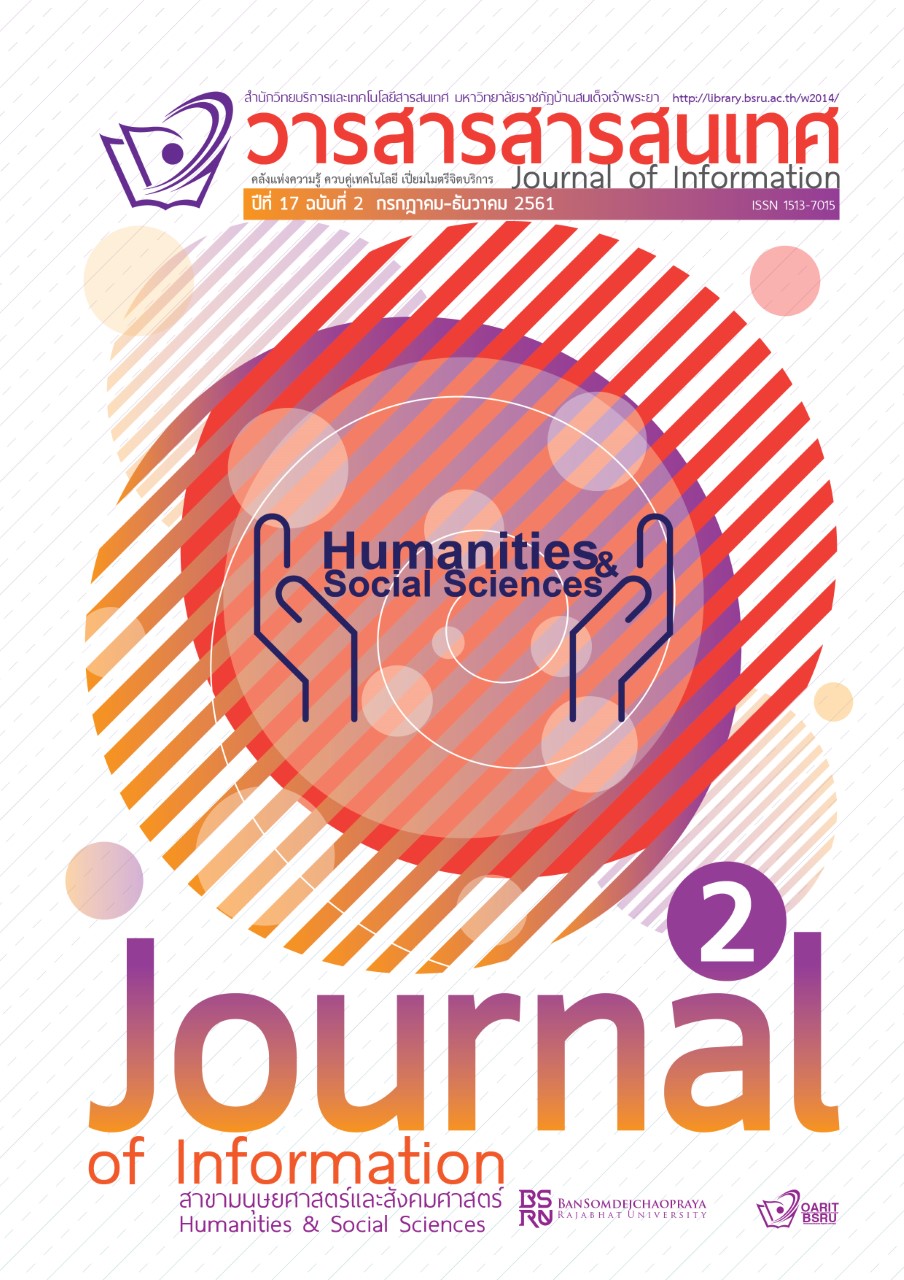The Development of English Communication Skills in Tourism for Thonburi Area Community, Bangkok
Keywords:
English for communication, Tourism, Thonburi Area CommunityAbstract
Abstract
The purposes of the study were to 1) investigate the English expressions the foreign tourists frequently used when visiting Thailand 2) survey needs for studying English for Tourism of people in tourist destination communities 3) construct a training package for developing English Communication Skills in Tourism based on Thonburi Area Community context 4) develop English Communication Skills in Tourism for people tourist destination communities 5) evaluate the trainees’ satisfaction on using English communication for tourism in real life situations including foreign tourists’ satisfaction on English communication skills of people in tourists destination communities. The samples of the study were 150 foreign tourists who visit the communities and 32 people from the communities in Thonburi Area. The instruments of the study consisted of a training package, an English proficiency test to be used as pre and posttest, and questionnaires for evaluating the trainees’ and foreign tourists’ satisfaction on English communication skills of people in the communities.
The results revealed that 1) English expressions that the foreign tourists frequently used when visiting Thailand were greetings and introductions, asking directions, buying things, asking information about places and ordering food 2) people in tourist destination communities need to study English expressions about greetings and introductions, giving directions, describing products, and ordering food 3) an English for tourism training package which consisted of a training document, a CD, teaching aids, lesson plans, and a training manual was constructed 4) the trainees’ posttest scores were significantly higher than pretest scores at .05 level which meant that their English communication skills were developed 5) the trainees’ satisfaction towards the training package and its utilization were at the highest level where as the satisfactions towards using English in daily life, self-confidence, and knowledge transfer were at a high level. The foreign tourists’ satisfaction towards English used on greetings and introductions, giving directions, buying things, describing products and ordering food were at a high level whereas the satisfactions towards overall English communication skills of the people were at a moderate level.
References
ธัญญลักษณ์ วีระสมบัติ. (2555). ASEAN Insight: AEC ดีหรือเสียต่อแรงงานไทย. กรุงเทพธุรกิจ ฉ. วันที่ 20 กันยายน 2555 สืบค้นเมื่อวันที่ 28 กันยายน 2557 จาก
bangkokpoll.bu.ac.th/ poll/ result
ธันยพร วณิชฤทธา. (2551). การท่องเที่ยวนิเวศ การท่องเที่ยวชุมชนทางเลือก-ทางรอด (๒). สืบค้น 12 กรกฎาคม 2557, จาก http://www.manager .co.th/Travel/
ViewNews.aspx?News ID=9510000125990
นงสมร พงษ์พานิช. (2554,มกราคม-มิถุนายน). การศึกษาปัญหาของการพูดภาษาอังกฤษในการสื่อสารด้วยวาจาของนิสิตคณะวิทยาการจัดการ มหาวิทยาลัยเกษตรศาสตร์ วิทยาเขตศรีราชา.
วารสาร มนุษยศาสตร์, 18(1)85-97.
แผนพัฒนาการท่องเที่ยวแห่งชาติ พ.ศ. 2555-2559. (2557). สถานการณ์ และแนวโน้มด้านการท่องเที่ยว. สืบค้น 22 มีนาคม 2557, จาก http/www. attm.biz/ news/ 3267
552555-2559.html
พิชัย สดภิบาล. (2553). การสื่อสารระหว่างวัฒนธรรม : ปัจจัยเพื่อการพัฒนาและส่งเสริมการท่องเที่ยว. สืบค้น 19 กันยายน 2557, จาก http://www.thaiblogonline.com/ sodpichai.blog?
ไพศาล กาญจนวงศ์. (2551). ความหมายและความสำคัญของการท่องเที่ยว. สืบค้น 16 พฤศจิกายน 2557, จาก http://lms.mju.ac.th/ courses/631/locker/ content
Downloads
Published
How to Cite
Issue
Section
License
บทความ ข้อความ ภาพประกอบ และตารางประกอบที่ลงพิมพ์ในวารสารเป็นความคิดเห็นส่วนตัวของผู้นิพนธ์ กองบรรณาธิการไม่จำเป็นต้องเห็นตามเสมอไป และไม่มีส่วนรับผิดชอบใดๆ ถือเป็นความรับผิดชอบของผู้นิพนธ์เพียงผู้เดียว






